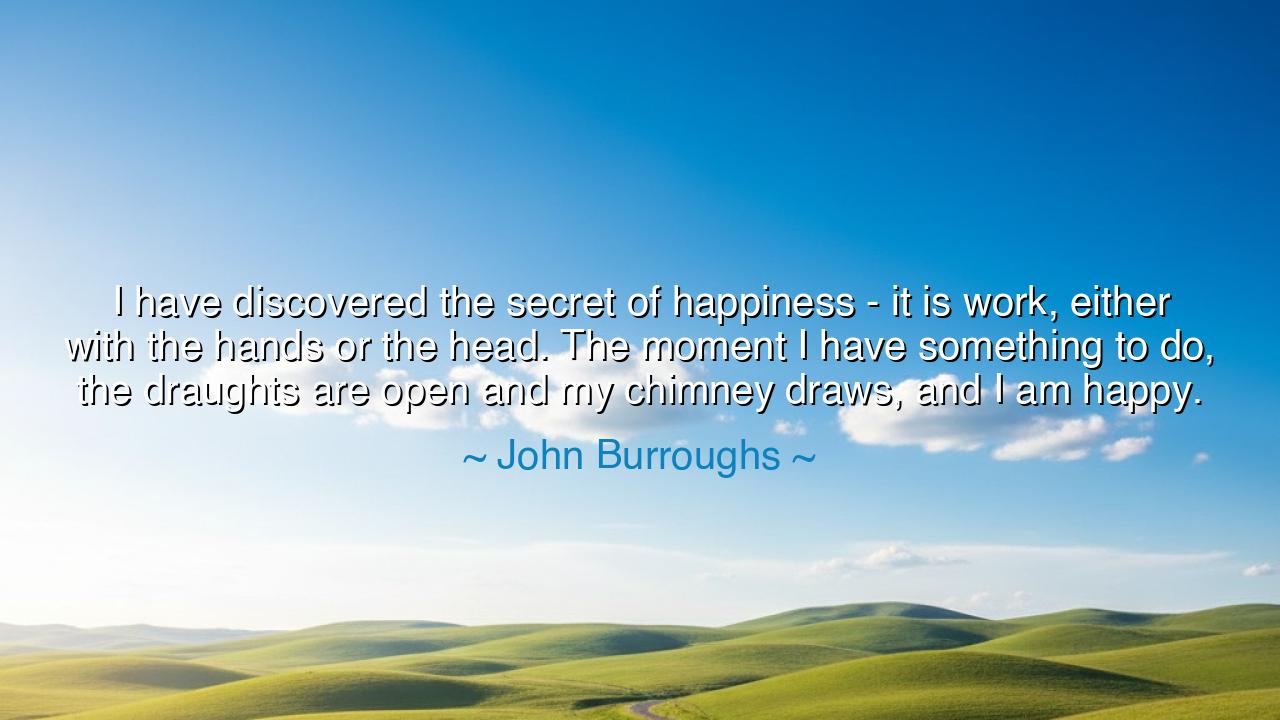
I have discovered the secret of happiness - it is work, either
I have discovered the secret of happiness - it is work, either with the hands or the head. The moment I have something to do, the draughts are open and my chimney draws, and I am happy.






In the serene voice of one who found wisdom in the soil, the sky, and the steadfast rhythm of human labor, John Burroughs once declared: “I have discovered the secret of happiness—it is work, either with the hands or the head. The moment I have something to do, the draughts are open and my chimney draws, and I am happy.” These words are a hymn to purpose, a revelation born not in luxury but in the quiet communion between man, nature, and effort. Burroughs, the philosopher of the American wilderness, spoke from a life steeped in observation, patience, and devotion to the simple yet profound truth that labor is the mother of joy.
To understand his meaning, one must first know the man. John Burroughs was not merely a naturalist or writer; he was a contemplative soul who found in every blade of grass and every dawn a reflection of divine order. Living close to the earth, he observed that idleness breeds discontent, but work, whether of the hands or the mind, brings alignment between the inner and outer worlds. When he says, “The draughts are open and my chimney draws,” he speaks metaphorically of the spirit that burns bright and clean when given purpose. The fire of life, like the hearth, smokes and chokes when stagnant, but when oxygen—action, endeavor, creation—flows through it, it burns steady and pure.
In these words lies an eternal law: happiness is not found in rest but in engagement. The idle man, who seeks joy through leisure alone, soon finds restlessness as his companion. The industrious man, who pours himself into his craft, his study, or his service, discovers peace as his reward. This truth echoes across the ages, from the fields of ancient Greece to the workshops of modern life. Hesiod, the poet of old, said that the gods placed toil upon man not as punishment, but as blessing—that through work, the soul is tested, tempered, and made divine. Burroughs merely restated this ancient wisdom in the language of his own age: to labor with purpose is to live in harmony with the universe.
History gives us countless witnesses to this truth. Consider Leonardo da Vinci, whose hands shaped art and invention, and whose mind never ceased its restless seeking. Even when burdened by doubt, Leonardo’s happiness lay in his work—the movement of brush, the sketching of flight, the exploration of anatomy and light. His peace did not come from applause or rest, but from the sacred act of doing. Similarly, Burroughs found joy not in fame or reward, but in writing, farming, and observing the subtle miracles of the natural world. In his own words, “The moment I have something to do, I am happy,” for to act is to participate in the great act of creation itself.
Yet Burroughs also reminds us that not all work is equal. It is not drudgery that brings happiness, but purposeful labor, born of love and sincerity. The man who works only for gain or praise soon grows weary; his heart rebels against the chains of necessity. But the one who works from passion—who writes, builds, teaches, or tends the soil because it fulfills his spirit—finds within his labor a source of calm delight. In such work, the self dissolves, and the soul becomes one with its task. That is the secret of the “chimney that draws”—when the heart, mind, and hand are united in a single, harmonious endeavor.
This truth also reveals the remedy for despair. Many in our time, and in all times, suffer not from misfortune but from meaninglessness. They wander in comfort yet hunger in spirit. To them Burroughs offers this timeless counsel: find something to do. It need not be grand, nor praised by the world; it need only be earnest and alive. The artist’s brush, the gardener’s spade, the scholar’s pen—all are sacred tools when guided by devotion. The soul that serves through its gifts finds contentment deeper than pleasure, for it draws from the inexhaustible spring of purpose.
Let this, then, be the lesson passed to those who walk after us: do not seek happiness as if it were a distant treasure, but build it with your own hands. Work is the rhythm of life, the divine music of creation. Whether you labor with your mind or your muscles, let your effort be sincere, your purpose pure, your spirit engaged. When you awaken each morning, find something worthy to do, and do it with all your heart.
For as John Burroughs taught, the secret of happiness is not found in ease, but in endeavor. When the heart burns with purpose and the soul breathes through work, the draughts are open, the fire draws bright, and one stands warmed in the quiet joy of being alive.






AAdministratorAdministrator
Welcome, honored guests. Please leave a comment, we will respond soon